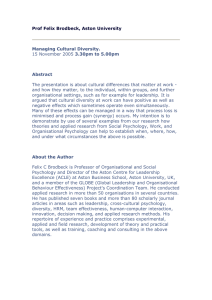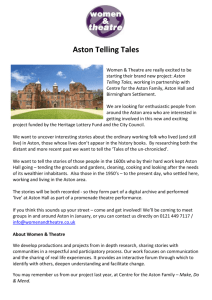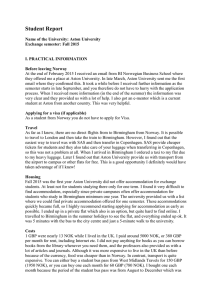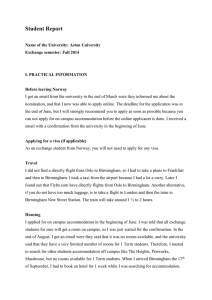Aston University Exchange Report: Fall 2014
advertisement
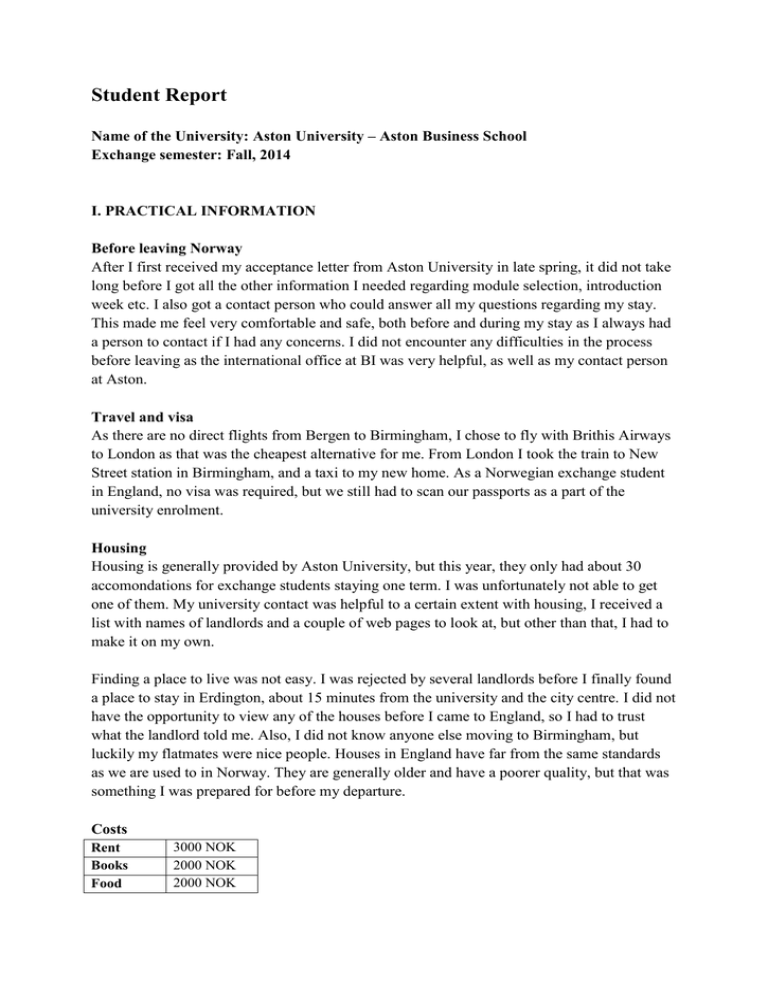
Student Report Name of the University: Aston University – Aston Business School Exchange semester: Fall, 2014 I. PRACTICAL INFORMATION Before leaving Norway After I first received my acceptance letter from Aston University in late spring, it did not take long before I got all the other information I needed regarding module selection, introduction week etc. I also got a contact person who could answer all my questions regarding my stay. This made me feel very comfortable and safe, both before and during my stay as I always had a person to contact if I had any concerns. I did not encounter any difficulties in the process before leaving as the international office at BI was very helpful, as well as my contact person at Aston. Travel and visa As there are no direct flights from Bergen to Birmingham, I chose to fly with Brithis Airways to London as that was the cheapest alternative for me. From London I took the train to New Street station in Birmingham, and a taxi to my new home. As a Norwegian exchange student in England, no visa was required, but we still had to scan our passports as a part of the university enrolment. Housing Housing is generally provided by Aston University, but this year, they only had about 30 accomondations for exchange students staying one term. I was unfortunately not able to get one of them. My university contact was helpful to a certain extent with housing, I received a list with names of landlords and a couple of web pages to look at, but other than that, I had to make it on my own. Finding a place to live was not easy. I was rejected by several landlords before I finally found a place to stay in Erdington, about 15 minutes from the university and the city centre. I did not have the opportunity to view any of the houses before I came to England, so I had to trust what the landlord told me. Also, I did not know anyone else moving to Birmingham, but luckily my flatmates were nice people. Houses in England have far from the same standards as we are used to in Norway. They are generally older and have a poorer quality, but that was something I was prepared for before my departure. Costs Rent Books Food 3000 NOK 2000 NOK 2000 NOK Transport Other 350 NOK 2000 NOK Compared to living on campus, my accommodation was realtivly cheap. Again, that is connected to the reduced standard of the house. I payed around 2750 NOK per month on rent, so all in all I payed about 3000 NOK per month as electicity and internet was payed seperatly. Books are not necessary to buy as the campus library has all the reading material you need available. I still chose to buy some of them, because I like to have them at hand at all times. It was also possible to buy some of the books second hand from the university book shop, and then return them there when you did not have use for them anymore. All in all, I spent about 2000 NOK on books and other school supplies. Food is fairly cheaper in England than what we are used to in Norway, so I did not spend as much money on food as I had expected. In addition, some friends of mine and I made dinner together several days a week, wich made the food costs even lower. As I lived off campus, I had to take the bus to the university every day. This took me about 15 minutes if no traffic. One of the first days in Birmingham, I bought a student bus card lasting the whole first school term, which let me take the bus as much as I wanted. This was a surprisingly high cost, alsmost the same as we are used to home in Norway. There are a lot of activities and social events happening at the university. A lot of money was spent on these events as well as fancy dresses for the many happenings. In addition, I bought a pay-as-you-go sim card for my phone, which was 150 NOK per month. Culture and language Considering that Birmingham is one of the most diverse cities in the UK, I got to meet a lot of people from different countries and cultures, both at the university and in the city. I did not encounter many language problems, and it only took me a couple of weeks before it became very natural to speak English. It helps when you are not around others speaking your language, forcing yourself to speak English at all times. Furthermore, I did find the academic language a bit hard, especially in the beginning. Also, a lot of the faculty were from other countries, sometimes making their English difficult to understand during lectures. This is one of the reasons why I had to study more, so that I could keep up in the lecrues. The exchange society at Aston arranged several trips for the students, one of them going to Edinburgh. I did not attend any of them, but I did visit London and Manchester during my stay. It is very simple to travel from Birmingham, as it is one of the largest cities in the UK with a lot of railway connections. II. ABOUT THE SCHOOL Please describe: Aston university is one of many universities in Birmingham. The university is devided into four areas of study; Aston Business School, being the biggest one, Engineering & Applied Science, Language & Social Sciences, and Health & Social Sciences. Aston University has about 10.000 students from over 120 countries, both undergraduates and postgraduates. All the facilities are located at the same campus, only five minutes from the city centre. It includes the Main Building, where most of the lecutures is held, the library, the gym and sports facilities, the health senter, the Student Union, where most of the social events is taking place, and of course there is a campus grocery store, Tesco. Course registration As an exchange student at Aston Business School, I was able to choose from a long list of modules available. This list was e-mailed to me by my Aston University contact, in addition to being available on the university’s homepage. The registration form had to be printed, filled out and sent to the university during the sommer, before the term started. The add/drop period ended after the first week of lectures, which I think is too early as I learned later that some of my courses was particularly hard and I would have liked to change them if possible. Academic calendar Arrival date: First day of the semester: Last day of classes: Examination period: Any special events/holidays: Other: 17. September 2014 6. October 2014 19. December 2014 12.-24. January 2015 Christmas holiday 20. Desember-6. January Course submissions might occur during the term, not only in examination period. Arrival The introduction weeks at Aston University are listed as one of the most well-conducted among all of the UK universities. After what I experienced, I strongly believe this is true. At Aston they have an “auntie” arrangement; older students helping the new ones settle in to the university. They arrange campus tours, city tours, and activities where you can get to know the other students. They walk around capus all day wearing colourful t-shirts which makes them easy to spot, and they are very helpful with whatever quiries you might have. The first week of the two introduction weeks, are called International Fresher’s. This is for the new international students and the exchange students only. This was a very good way of meeting new people in the same situation as you, but from different countries. I met some of my dearest friends here. The first week included enrolment at the university, and we spent the week getting to know both the city, the university and out new homes. As well as getting to know each other during a lot of activities arranged by the “aunties”. The second week was intended for all the new students. It was hard meeting new people this week as it seemed like many of the British students knew each other from before. During this week there was arranged a lot of parties, and I spent a fun week together with my new friends. The International Office As an exchange student I received a lot of information from the International Office. They were always helpful, answered e-mailes quickly, and wanted our stay to be as fulfilling as possible without any struggles. Social activities The relationship between native students and exchange students was good. Most of my brithish friends I met during international freshers as “aunties”, some through university societies like hockey, and a couple during lectures. At Aston University there is a society called “Aston Exchange Society”, which is run by international students for international and exchange student. The society arranges trips, activities and gatherings all throughout the academic year, and everyone is welcome to join. Also, the other societies at Aston are very welcoming to new students. There are a lot of sports societies, like football, hockey and rugby. In addition, there are several nationality societies one can join, unfortunately not a Norwegian og Scandinavian one yet. III. ACADEMICS In the classroom The teaching style at Aston University is mostly theoretical during the lectures, and more practical in the smaller tutorials. Discussion and attendance during lectures is generally dependent on the size of the class, there is not room for a lot of two-way communication in the larger classes. Therefore, it is very important to attend the tutorials, where students gets divided into smaller groups, and the emphasis is put on discussion and practical problem solving. At Aston, I would say that it requires a lot more further reading compared to that at BI. Also, the workload is different with coursework submissions and small exams throughout the term. At the same time, the academic language is fairly difficult, therefore it required a lot more studying to be able to keep up and understand the subjects. Course materials After what I experienced, the lectures at Aston Univerity are essentially based on Powerpoints. Furthermore, a lot of the lecturers have written parts of the course material and relevant books themselves, and therefore the lectures are also based upon this. In addition, they expect the students to do a lot of external reading like online articles and journals etc. to broaden their learning. At the same time most lectures are recored, i.e. you can watch them online later if you missed out on something or was not able to attend class. Exams All my five written exams was based upon course material, lecture slides, tutorials, case studys and furthere readings. It is not common to work with past exam papers, which I am used to at BI, so preparing for the exams required me to find a new way of studying. Throughout the semester I had three courseworks, one due in mid November, the two others at the end of term one in December. This was the only courseworks I had, but again that depends on the courses you take abroad. I know that it is common with group work, small exams, quizzes and presentations throughout the semester. Furthermore, class attendance is not mandatory and does not affect the final grade. Library and technology The library at Aston University has a lot of facilities. It is a large library, with computer rooms, group rooms, cafés and a Learning Development Centre, where you can get help with assignments etc. It is also possible to rent laptops and they evidently have all the books and journals you need to get through an exam or coursework. In addition, the staff that works at the library is always helful if you need to find a book, or if you need someone to read your essay or listen to your presentation and give you feedback. Description of courses Course code & name BN2216 Operations Management BS2232 Business Policy Master/ Bachelor Bachelor Bachelor BF2244 Strategic Finance Bachelor BS3336 Applied Econometrics and Forecasting BS3347 Economics of Entrepreneurship BF3394 Auditing and Professional Ethics Bachelor Bachelor Bachelor Exam form Prerequisites Comments 1,5-hour open book multiple-choice exam (100%). 1,5-hour closed book multiple-choice exam (100%). 2-hour closed book multiple-choice exam (100%). None Light, but interesting and useful course. Light and interesting course. Coursework (30%), 2-hour closed book written exam (70%). Coursework 1 (50%), coursework 2 (50%). Econometrics 3-hour closed book exam (100%). None None None None Simple course. Quite similar to “Økonomistyring I&II” at BI. Heavy course. Required a lot of reading and work. Interesting course, but a large amount of work. Heavy course. Required a lot of reading and work. On a final note, how will you sum up the exchange experience? Finally, I want to say that going on exchange has been one of the best decision in my life, and I do not regret it a second. At the same time, I did meet a couple of challenges regarding the academics, as it turned out I had chosen some courses that were above my academic level. Furthermore, this only made me stronger as I grew a lot as a person throughout this experience, and traveling alone also made me take more responsibility. Throughout my stay in Birmingham and at Aston University, I learned a lot concerning the academics, I improved my English and also I learned a lot about myself and what I want with my future. At the same time, I made a lot of new friends from all over the world, who made this exchange semester better than ever expected. I will, without doubt, recommend it to everyone that has the opportunity, take a chance – you will not regret it.
